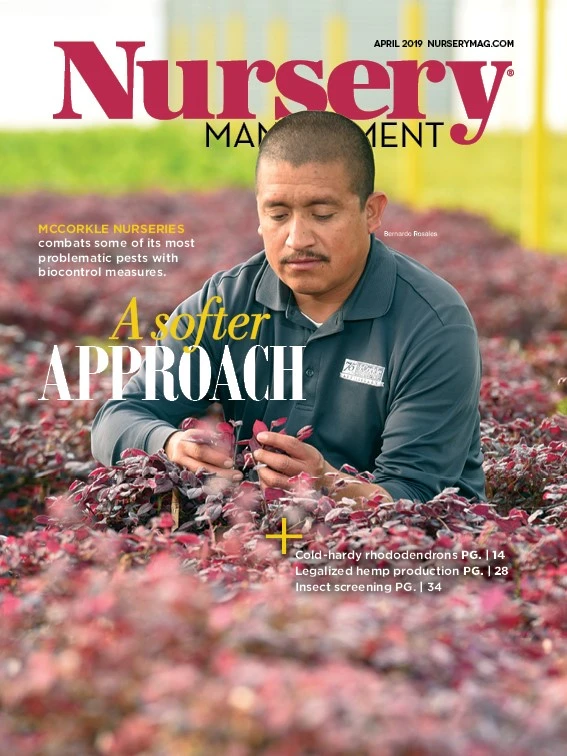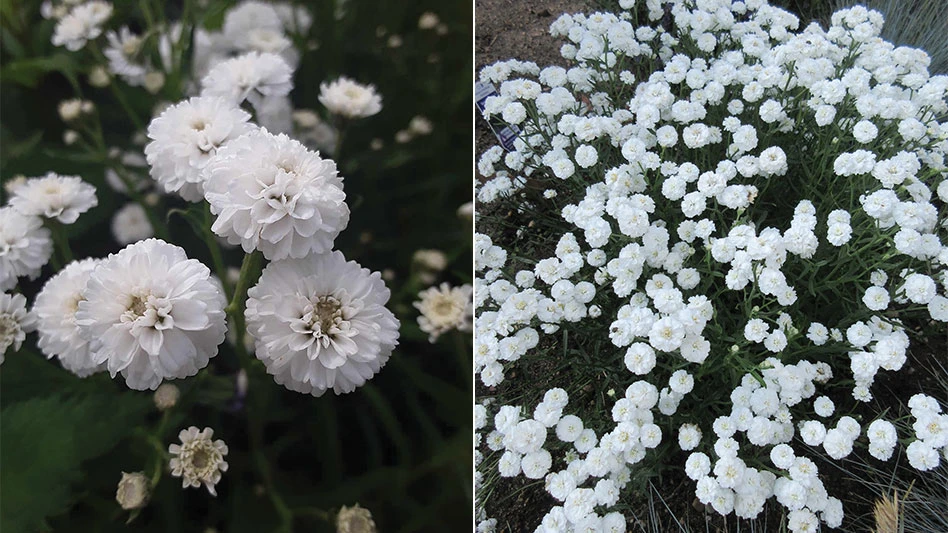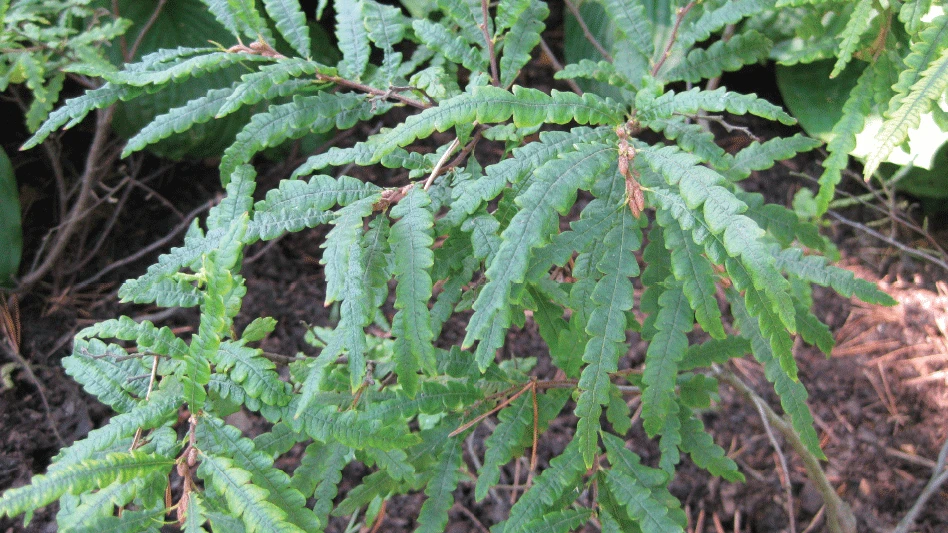

When Andrew Graves was a boy in rural Kentucky in the 1960s, he didn’t believe he’d grow up to be a hemp farmer like his grandfather, like generations of Graves men before him. Since 1937, under the Marihuana Tax Act, the crop had been illegal to grow and process in the U.S., and it seemed to him that prohibition may stretch on forever.
“When I was a kid, before I went to college, all we did was talk about what those people did way back,” he says. “I saw a whole warehouse full of hemp brakes that they used in the harvesting of the crop.” (A hemp brake is an antiquated piece of cultivation equipment used to draw loose strands of hemp fiber contained within the husk of the plant.) “I had no idea how they worked,” he continues. “I never saw one guy ever use one; you just heard bits and pieces.”
The folklore of domestic hemp cultivation followed Graves through decades of work as a tobacco farmer in Clark County, Ky., where good, loamy soil helped to keep his family’s legacy upright. As tobacco fell out of favor during the back end of the last century, however, Graves was unsure what would happen. He wasn't alone. “There was no one speaking in terms of what’s next,” he says. “How can we survive as farmers if there’s no tobacco?”
To feel his way into the future, Graves looked to the past.“There were a lot more people than just one or two [of us] moving mountains,” he says of the national advocacy campaign to legalize hemp. “It just wasn’t me; it was a lot of people in this state helping to make this come true. Kentucky is paving the way for other states.”
In 2014, Graves and a Kentucky-bred board of directors formed Atalo Holdings Inc., which now boasts a suite of hemp cultivation, processing, manufacturing and research initiatives. The company, based in Winchester, Ky., shares 147 acres with GenCanna Global USA on what executives call the Hemp Research Campus. Those two companies formalized a partnership on Dec. 12, 2018, at the dawn of the legal domestic hemp industry in the U.S., according to a press release, to “create the largest vertically integrated hemp-derived CBD production, processing and distribution alliance in Kentucky.”
Now, in 2019, with hemp production federally legalized in the U.S., thanks to the recent passage of the Agriculture Improvement Act of 2018 (aka the 2018 Farm Bill), Atalo Holdings and GenCanna find themselves on the cusp of an intriguing agricultural paradigm shift. Hemp-derived products run the gamut from CBD-infused beverages and hemp oil supplements to building materials and plastics. The hemp-derived CBD market is expected to reach $22 billion by 2022, according to a Brightfield Group report, now that the crop is fully legal in the U.S.
If the work to get to this point was a circuitous odyssey through politics and American cultural mores, then the work needed to create a regulated hemp market in the U.S. is a whole other story.
The federal debate
In June 2018, U.S. Sen. Mitch McConnell, R-Ky., found himself at the vanguard of hemp reform in Washington, D.C. After opening the door to small-scale hemp cultivation with the 2014 Farm Bill, McConnell pushed his vision of a domestic hemp industry further. He took the 2018 Hemp Farming Act—a bill he introduced to federally legalize the production and sale of industrial hemp—and added it to the 2018 Farm Bill. Aside from a smattering of proxy debates over what a legal hemp market would look like, support was nearly universal.
Congress passed the $867-billion agriculture bill on Dec. 12, President Donald Trump signed it into law on Dec. 20, and for the first time in 81 years, the U.S. had legal hemp.
The president’s signature removed hemp from the U.S. Controlled Substances Act (CSA). The move delineated “industrial hemp,” which can contain no more than 0.3-percent THC, into a distinct category from its psychoactive counterpart, known legally as marijuana.
States control the regulatory structure for this new hemp era, though the U.S. Department of Agriculture (USDA) must approve each state’s prescribed oversight regimen, meaning farmers cannot simply begin growing hemp on private land. Only once a state’s program has been approved on the federal level may hemp farmers apply for a growing or processing license from their own state department of agriculture. For states that opt not to develop their own licensing schemes, prospective hemp farmers may run their applications directly through the USDA, which will eventually construct its own federal program.
This model builds on the hemp research licenses first developed under the 2014 Farm Bill, the previous and more conservative reform ushered in by McConnell. Already, 40 states oversee these hemp cultivation and research “pilot programs” for industrial and commercial purposes. But because hemp remained a Schedule I substance until the new 2018 law was passed, the plant and its cannabinoid ingredients were subject to the whims of the Drug Enforcement Administration. Interstate commerce, while legal in certain cases, fell into a regulatory gray area, conflating who controlled what. The 2018 Farm Bill clarified most of that.
The new law allows interstate commercial transfers and sales of hemp and hemp-derived products. That law only goes so far, eventually clashing with the U.S. Food and Drug Administration (FDA), which has roundly rejected the notion that hemp-derived CBD products are legal. "Selling unapproved products with unsubstantiated therapeutic claims is not only a violation of the law, but also can put patients at risk, as these products have not been proven to be safe or effective," FDA Commissioner Scott Gottlieb wrote shortly after the 2018 Farm Bill was approved by Congress. In the FDA’s view, CBD is an active ingredient in a pharmaceutical drug (Epidiolex) and, like other active drug ingredients, cannot be sold separately.
Graves says that one phase of hemp reform is passing into another: “I feel like I have been a runner on a long journey, jumping hurdles, and the last hurdle has been jumped over. We’ve run to the finish line. So, the next race will be the FDA challenges that all companies will have to incur.”
What comes next is complicated, but hemp farmers have much to gain from the Farm Bill’s provisions, even in the short-term. They can legally access banking and insurance, for example, a caveat that Elite Botanicals CEO David Bonvillain says will remove entry barriers to starting a legitimate business in the space.
When Bonvillain launched his Loveland, Colo.-based CBD-hemp cultivation, extraction, processing and product development business in 2013, the company was forced to purchase most of its equipment in cash.
“That’s just not traditionally how you would start an industrial manufacturing business that costs millions of dollars in capital,” Bonvillain says. “Those are normally subsidized by banks and investment capital that really wasn’t available to anybody in the industry largely until the last few months if you had a long-standing relationship with a financial institution. Now, you can actually take paperwork to them and show that what you’re doing is legal.”

Ripe with opportunity
And that’s only the beginning of this new era.
“We're expecting [the hemp-derived CBD] market to grow about tenfold between 2018 and 2019, with chained retailers bringing product to a significantly wider audience and driving a great deal of that growth,” says Brightfield Group Senior Analyst Jamie Schau. With hemp legalization comes the trickle-down effect of broad commercial development of the plant’s chemical components. The marquee compound, of course, being cannabidiol, or CBD.
CBD beverages and pet products are expected to generate tremendous waves of consumer interest and agricultural production. Schau adds that niche audiences, such as athletes, will drive demand for CBD products, as well.
Interest in hemp products will only increase among larger corporations, especially consumer packaged goods companies, Schau says, although they may not enter the market until the FDA has developed a clear position on CBD as a supplement or food additive. There’s the rub.
Officially, the FDA has only allowed the fiber and oil from hemp seeds to be used in food products, a stance that stems from a 2004 precedent set by Hemp Industries Association v. Drug Enforcement Administration (HIA v. DEA) — one that only some states have followed. The California Department of Public Health (CDPH), for example, issued an official state policy in July 2018, which aligned with the FDA’s stance and prohibited hemp-derived CBD in food products. The state will likely continue to lean on federal policy, Bonvillain says, which could start to shift as broader federal hemp regulations take shape.
As the hemp-derived CBD market gains traction, the industry shouldn’t expect CBD sales to take away market share from THC-based marijuana products. The two product categories are already branching off on a regulatory level, and two distinct markets are forming.
CBD products are often marketed as medical in nature, and Bonvillain believes that these will eventually be confined to a regulated medical market—with clinical trials and FDA approvals.
Already, the FDA approved the marijuana-derived drug Epidiolex (not hemp-derived), which contains CBD. The DEA approved the drug and specifically carved out an exemption from the CSA for FDA-approved drugs that contain CBD and contain less than 0.1-percent THC—an even more stringent demarcation line than the traditional legal definition of hemp. According to a 2018 report in Cannabis and Cannabinoid Research, this move could very well set a precedent for how the FDA and the DEA consider CBD-infused products in the future.
That’s the “next race” that Graves was referencing.
In the meantime, domestic farmers, already increasingly eyeing the cannabis market, are sure to take a close look at rotating a hemp crop into their portfolios.
A cannabis cultivator’s decision to grow hemp should be a strategic one, Bonvillain says, given the crop’s agricultural challenges and requirements, which differ from cannabis, which is a more horticulture-focused crop. Vertically integrated hemp-derived CBD product manufacturers may be able to reduce their cost of goods sold (COGS) by growing their own hemp, but they should first perform a business analysis to see if sourcing it from elsewhere is actually more cost-effective. Depending on the volume of hemp needed and the amount of space and equipment required to produce, harvest and process the necessary amount, purchasing hemp from another source may make more sense.
In addition, hemp currently doesn’t offer the scalability and automation that traditional agriculture expects, he adds. “The type of [supply-chain] infrastructure isn’t really there with this crop yet, so there are still some barriers to entry from large-scale agriculture that are being overcome literally by the day.”
Although the USDA program outlined in the Farm Bill aligns with some states’ current hemp cultivation pilot programs, such as Colorado’s, it will take farmers time to become licensed under the new system.
“Each [state’s] Department of Agriculture is required to build their whole program [and] submit that to the USDA,” Bonvillain says. “The USDA has to approve it, and then you have to license farmers. Just that process alone is going to take us through 2019. I’d imagine it’s going to be 2020 before you have a lot of the new states getting their programs online.”

Research wanted (and needed)
The 2018 Farm Bill rolls hemp into the USDA’s Critical Agricultural Materials Act as a “hydrocarbon-containing plant.” According to a Dec. 14 Brookings Institute report on the legislation: “This provision recognizes the importance, diversity and opportunity of the plant and the products that can be derived from it, but also recognized an important point: There is still a lot to learn about hemp and its products from commercial and market perspectives.”
Stuart Titus, CEO of publicly traded CBD product manufacturer Medical Marijuana Inc., says this is the key. There’s speculation as to how markets will embrace a legal U.S. hemp industry, but the fact that private stakeholders can now freely examine the plant’s properties is paramount. “Over time you’ll see a great amount of research coming forth on CBD, and this helps to prove out some of the therapeutic or medicinal benefits,” he says. “This has great application for all of us in the CBD industry, just to be able to show some of these benefits to the medical community.”
That doesn’t even scratch the surface of hemp’s global renaissance, as countries around the world legalize the crop and begin to grasp its chemical makeup. For now, though, an American revolution awaits.
Back at Atalo Holdings and GenCanna, the future is bright. Kentucky’s commissioner of agriculture, Ryan Quarles, was the first in the country to submit to the USDA his commonwealth’s plans to regulate hemp production. (That same week, in late December, a congressional appropriations impasse led to a federal government shutdown, and neither the USDA nor the FBI had been able to address any hemp application paperwork. On Jan. 25, however, the government was temporarily reopened.)
Whenever the market develops, Graves says he’ll be anticipating the new product innovations, the research capabilities, the pure work of American agriculture.
“The FDA will stomp their foot and cause delays,” he says. “But in enough time, we will see this plant become very entrenched in our local life and in the ag life, either as food or clothing or shelter. And that’s why it never should have been outlawed. Any plant that will help feed you and clothe you and shelter you and provide medicine—that should never have been illegal, in my opinion. And it’s unfortunate that [for] 70-plus years that plant was absent from the landscape. But of course, now is the new dawning and it’s a new day and I’m sure happy to be alive and watching it happen.”
This article originally appeared in Cannabis Business Times, a GIE Media publication. Eric Sandy is the digital editor for Cannabis Business Times and Cannabis Dispensary. Melissa Schiller is the assistant digital editor for Cannabis Business Times and Cannabis Dispensary.

Explore the April 2019 Issue
Check out more from this issue and find your next story to read.
Latest from Nursery Management
- Dümmen Orange North America celebrating 25th anniversary in 2025
- Illinois Landscape Contractors Association changes name to Landscape Illinois
- 2025 Proven Winners Horticulture Scholarship applications now open
- ICL’s Gemini Granular herbicide now registered for use in California
- Eurazeo Planetary Boundaries Fund acquires Bioline AgroSciences
- The Leading Women of Horticulture
- Leading Women of Horticulture: Dana Massey, Plantworks Nursery
- Spring Survival Guide





